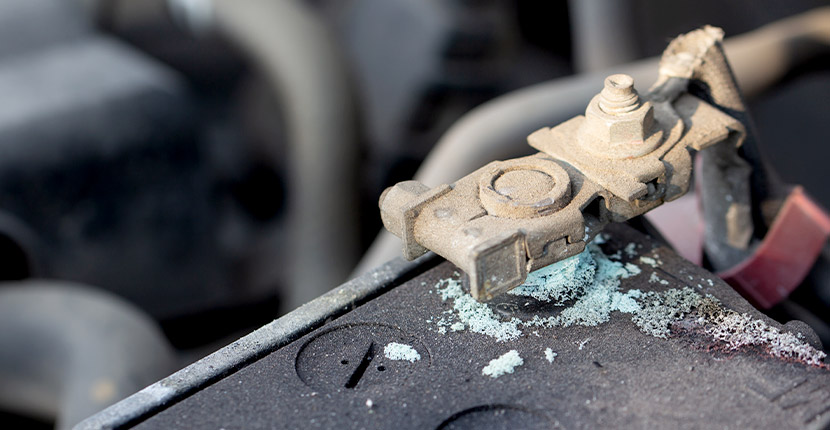What Causes Battery Sulfation and Corrosion?
- by Bryan Veldboom - updated on 4/20/2022

Corrosion and sulfation are an auto battery's worst enemies. The first one attacks your battery's plates, while the second eats away at its terminals. If left unchecked for long enough, both of them will kill your battery completely. Find out what causes sulfation and corrosion and what you can do to help prevent them.
What is Plate Sulfation?
When your battery discharges, small sulfate crystals made of a combination of lead and sulfur form on your battery's plates. This is a normal part of the discharge process, which is reversed when the battery is recharged. If you leave a battery discharged for too long, however, this soft lead sulfate deposits on the negative plates, where it becomes hard, stable crystals which impede the battery's flow of electrical current.
Can Battery Sulfation Be Reversed?
Sulfation can be reversed in a flooded lead acid battery if it is detected early enough. This is done by applying an overcharge to a fully charged battery using a regulated current of around 200mA (milliAmps) for a period of roughly 24 hours. This allows the battery's terminal voltage to rise between 2.50 and 2.66 volts per cell, helping to dissolve the crystals.
Unfortunately, aside from tearing the battery down, it's very difficult to tell if your battery's performance is being affected by sulfation or some other cause. That's why it's much easier to prevent sulfation from happening in the first place. What is the easiest way to prevent sulfation? Keep your battery charged. That means driving your vehicle at least once a week at highway speeds for around 30 minutes or so.
If you have a vehicle that you keep in storage for part of the year, be sure to maintain its state of charge using a battery charger. Battery maintainers are a great way to do this, since you can connect them to your battery indefinitely without fear of overcharging it. For other tips, read our article entitled "How Do You Keep a Car Battery from Dying When Not in Use?"
What is Battery Corrosion?
Corrosion is a buildup of colorful material (typically white, green or blue) that occurs on your battery's terminals or cables, which impedes the flow of power and causes them to deteriorate over time. There are several different causes of corrosion. Lead acid batteries occasionally vent sulfuric acid vapor and hydrogen gas. Corrosion can occur when these gasses react with the heat under your hood and the metal on the battery's terminals. Corrosion also results from overcharging your battery. As a battery ages, the terminals become more likely to corrode.
What Problems Can Corroded Battery Terminals Cause?
Corrosion limits the amount of power that can travel from the battery to your vehicle's engine and from the charging system back into the battery. This hurts your battery's performance, making it more difficult to start up your engine. It also impedes the battery's ability to charge properly and, if allowed to go on for too long, will kill your battery entirely. Corrosion can also damage other parts of your vehicle, such as the battery cables and even the electrical and power delivery system.
How Do You Prevent Battery Corrosion?
As part of your regular auto maintenance, be sure to check your battery terminals for signs of corrosion. If you do notice a buildup of corrosion, you can clean it off using a battery terminal brush and a solution of baking soda and water.
You can help prevent future corrosion by coating your terminals in an anti-corrosion spray. Batteries Plus also offers a set of terminal protectors that are coated in a compound that helps stop corrosion caused by battery acid fumes. Finally, if you use a charger on your battery, be sure that the voltage of your charger matches that of your battery and that it's compatible with the chemistry of your battery (i.e. flooded lead acid or AGM). If your charger isn't equipped with a float stage, be sure you monitor the charging process to ensure that you don't overcharge your battery.
Shop Batteries Plus for Your Auto Battery Needs
Are you experiencing issues with the battery in your car or truck? Bring it to your nearest Batteries Plus location and we'll test it for you, free of charge. If you need a replacement, we have top-quality auto batteries available from trusted brands like Duracell Ultra, X2Power and more. Plus, we offer expert installation on most makes and models at most of our locations. You'll find other essential gear like windshield wiper blades, jumper cables and flashlights in our Automotive Center.